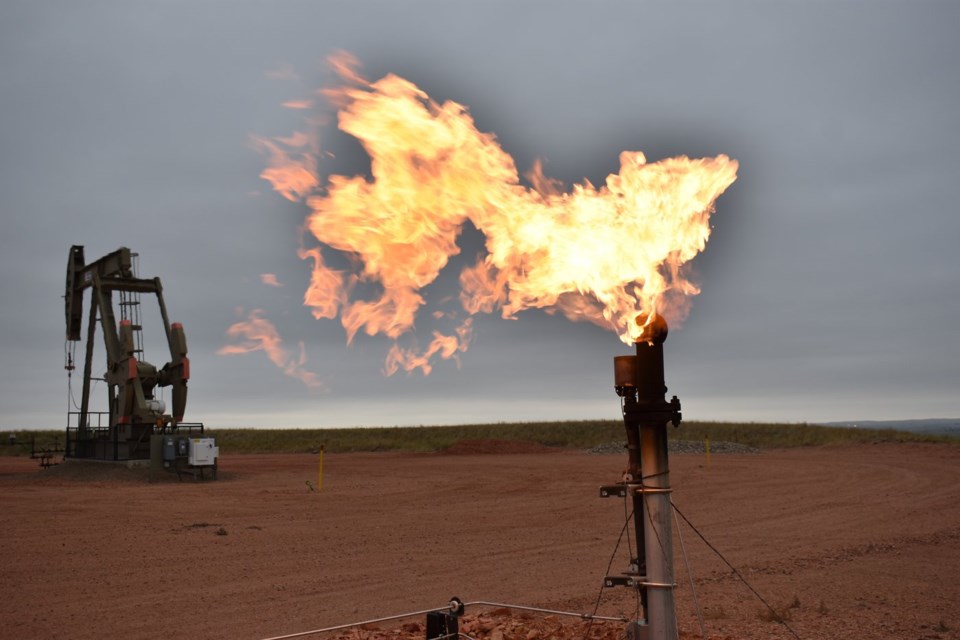WASHINGTON (AP) ŌĆö Oil and natural gas companies for the first time will have to pay a federal fee if they emit dangerous methane above certain levels under a final rule announced Tuesday by the Biden administration.
The Environmental Protection Agency rule follows through on a directive from Congress included in The to adopt best practices that reduce emissions of methane ŌĆö the primary component of natural gas ŌĆö and thereby avoid paying.
Methane is a climate ŌĆ£super pollutantŌĆØ that is far more potent in the short term than carbon dioxide and is responsible for about one-third of greenhouse gas emissions. The oil and natural gas sector is the largest industrial source of methane emissions in the United States, and advocates say reduction of methane emissions is a crucial way to slow climate change.
The rule, announced at an in Azerbaijan, comes a day after President-elect Donald Trump to head the agency in Trump's second term. If confirmed by the Senate, Zeldin is expected to move to reverse or loosen dozens of environmental regulations approved under President as Trump seeks to establish U.S. ŌĆ£energy dominanceŌĆ│ worldwide.
Trump is likely to target the methane fee amid a flurry of expected actions he has promised to deregulate the oil and gas industry.
As outlined by the EPA, excess methane produced in 2024 could result in a fee of $900 per ton, with fees rising to $1,200 per ton in 2025 and $1,500 per ton by 2026. Industry groups are likely to challenge the rule, including any effort to impose a retroactive fee.
The rule will not become final until early next year, following publication in the Federal Register.
EPA Administrator Michael Regan said in a statement that the rule will work in tandem with a The rule targets the U.S. oil and natural gas industry for its role in global warming as Biden seeks to secure his legacy on fighting climate change.
The fee, formally known as the , will encourage early deployment of available technologies to reduce methane emissions and other harmful air pollutants, Regan said. The fee "is the latest in a series of actions under President BidenŌĆÖs methane strategy to improve efficiency in the oil and gas sector, support American jobs, protect clean air and reinforce U.S. leadership on the global stage,ŌĆØ he said.
Industry groups and Republican-led states have challenged the earlier methane rule in court, but while the case continues before lower-level judges.
Opponents argue that EPA overstepped its authority and set unattainable standards with the new regulations. The EPA, though, said the rules are squarely within its legal responsibilities and would protect the public.
Many large oil and gas companies already meet or exceed methane-performance levels set by Congress under the climate law, meaning they are unlikely to be forced to pay the new fee, Regan and other officials said.
Even so, EPA estimates that the rule will result in cumulative emissions reductions of 1.2 million metric tons of methane (34 million metric tons of carbon-dioxide equivalent) through 2035. That figure is similar to clean-air gains from taking nearly 8 million gas-powered cars off the road for a year, the EPA said. Cumulative climate benefits could total as much $2 billion, the agency said.
Like the earlier methane rule, the new fee faces a near-certain challenge from industry groups. The American Petroleum Institute, the oil and gas industryŌĆÖs largest lobbying group, said the fee ŌĆ£hampers our ability to meet the growing energy needs of American families and businesses and fails to advance meaningful emissions reduction."
API senior vice president Dustin Meyer said the group looks forward to working with the Trump administration and the new Congress to repeal the fee and ŌĆ£get this right."
Environmental groups hailed the new fee, saying oil and gas companies should be held accountable for pollution that contributes to global warming. Oil and gas companies routinely calculate that itŌĆÖs cheaper to waste methane through flaring and other techniques than to make necessary upgrades to prevent leaks, they said.
ŌĆ£While we expect the next administration to recklessly greenlight fossil fuel extraction, itŌĆÖs heartening to see this effort to make polluters pay for their leakage of the super climate pollutant methane,ŌĆØ said Maggie Coulter, a lawyer at the Center for Biological Diversity, an advocacy group.
ŌĆ£Ultimately, we know that curbing the climate emergency requires moving quickly away from fossil fuel extraction," Coulter said. ŌĆ£The oil and gas companies doing so much damage to our climate should have to pay for the methane leaks theyŌĆÖve so outrageously failed to fix.ŌĆØ
Matthew Daly, The Associated Press




